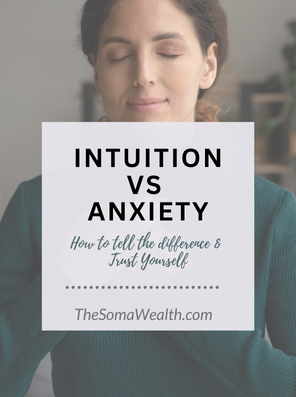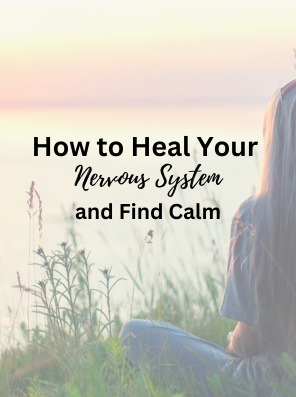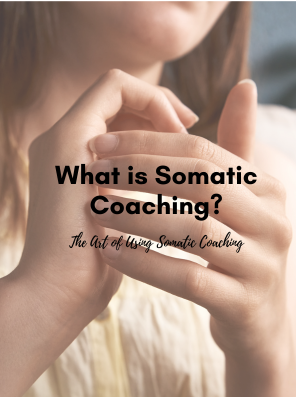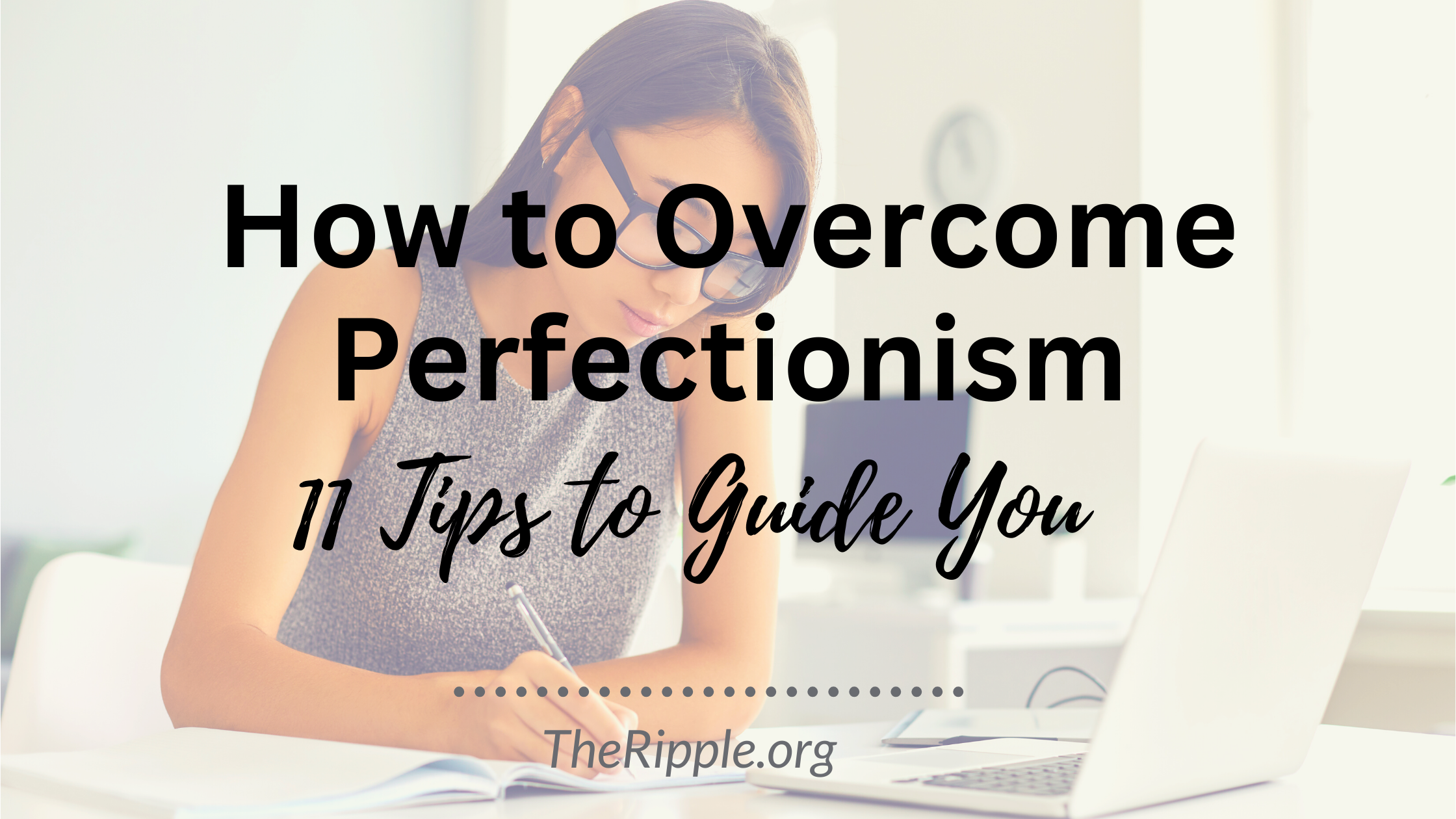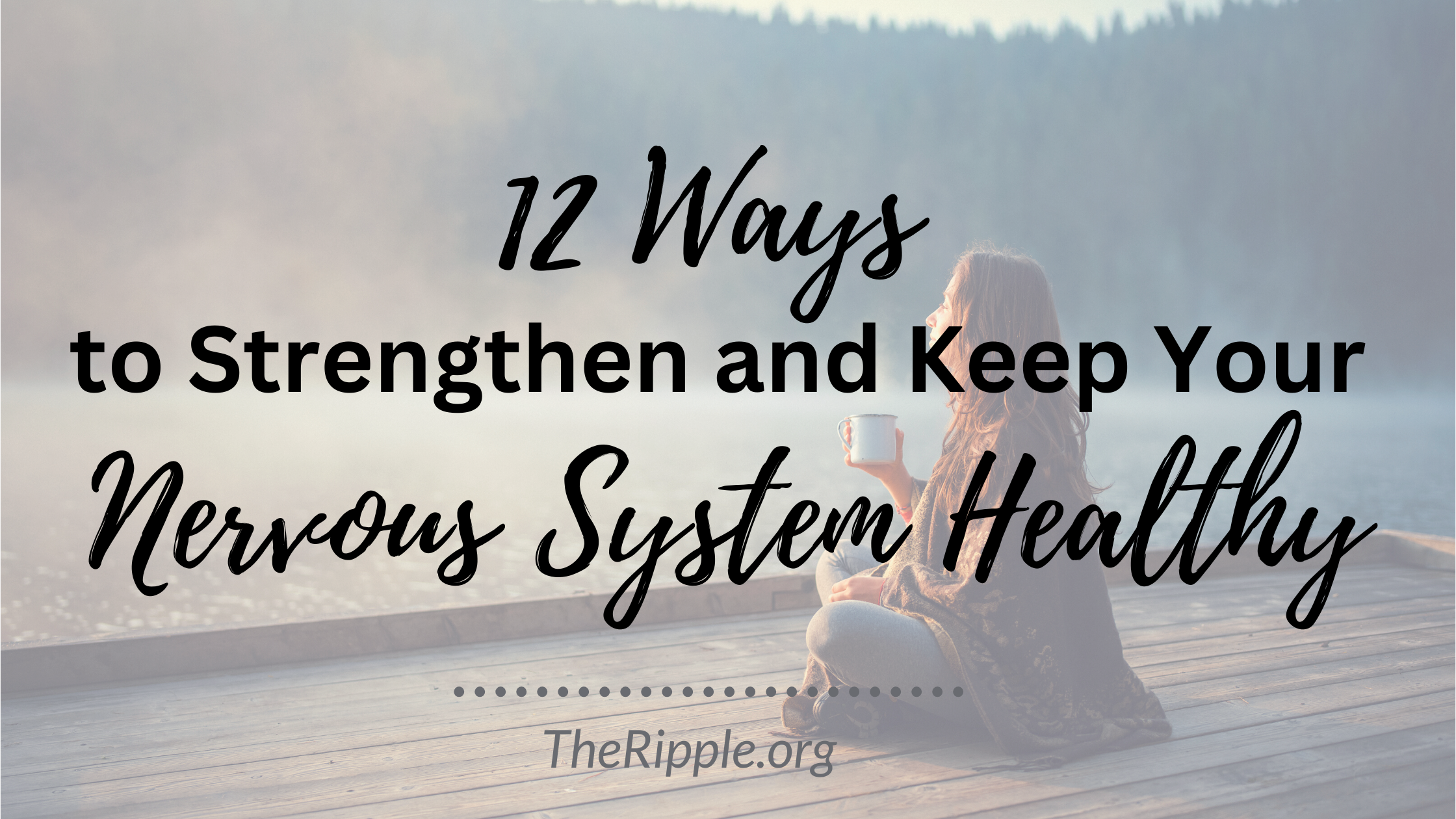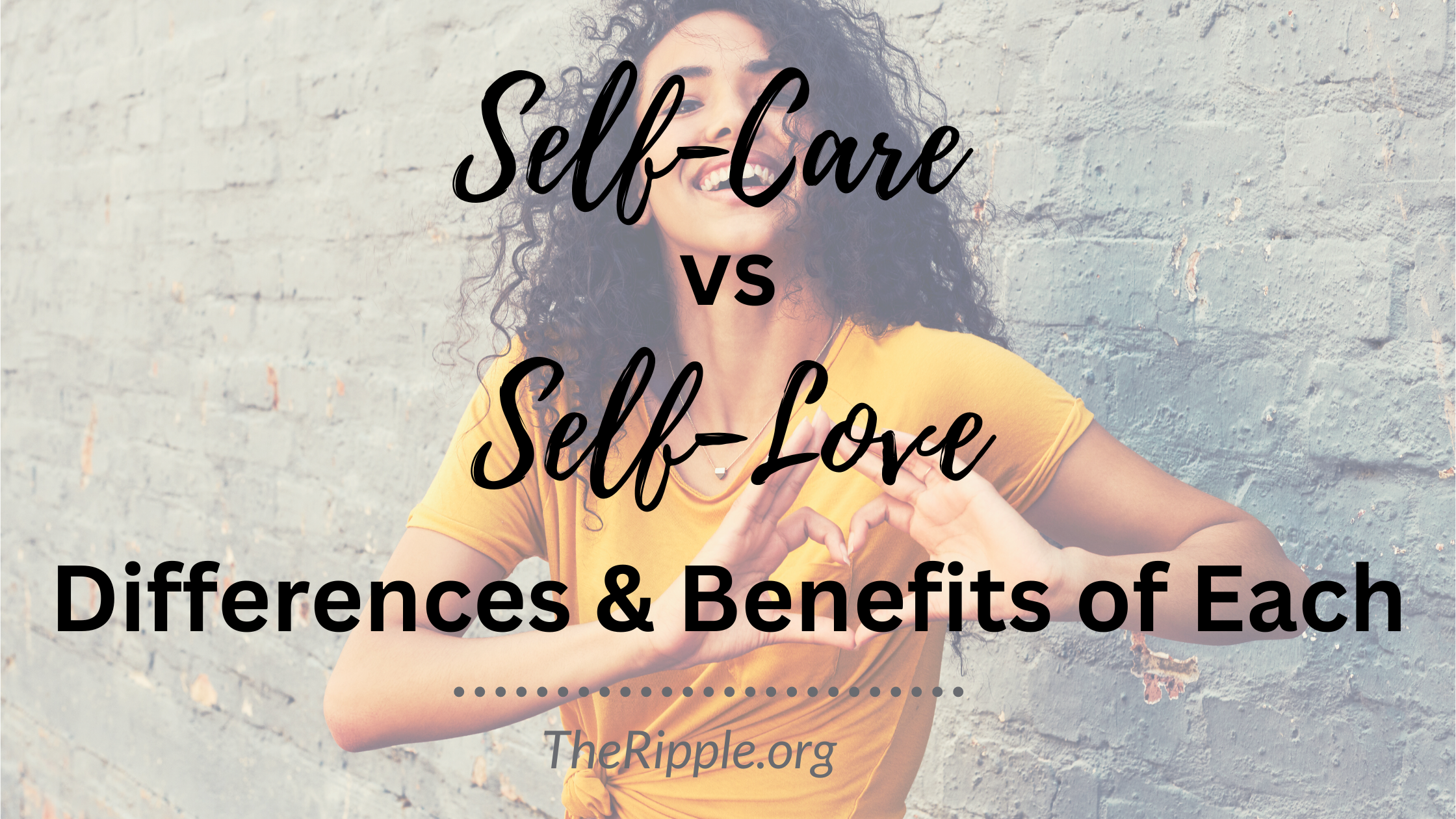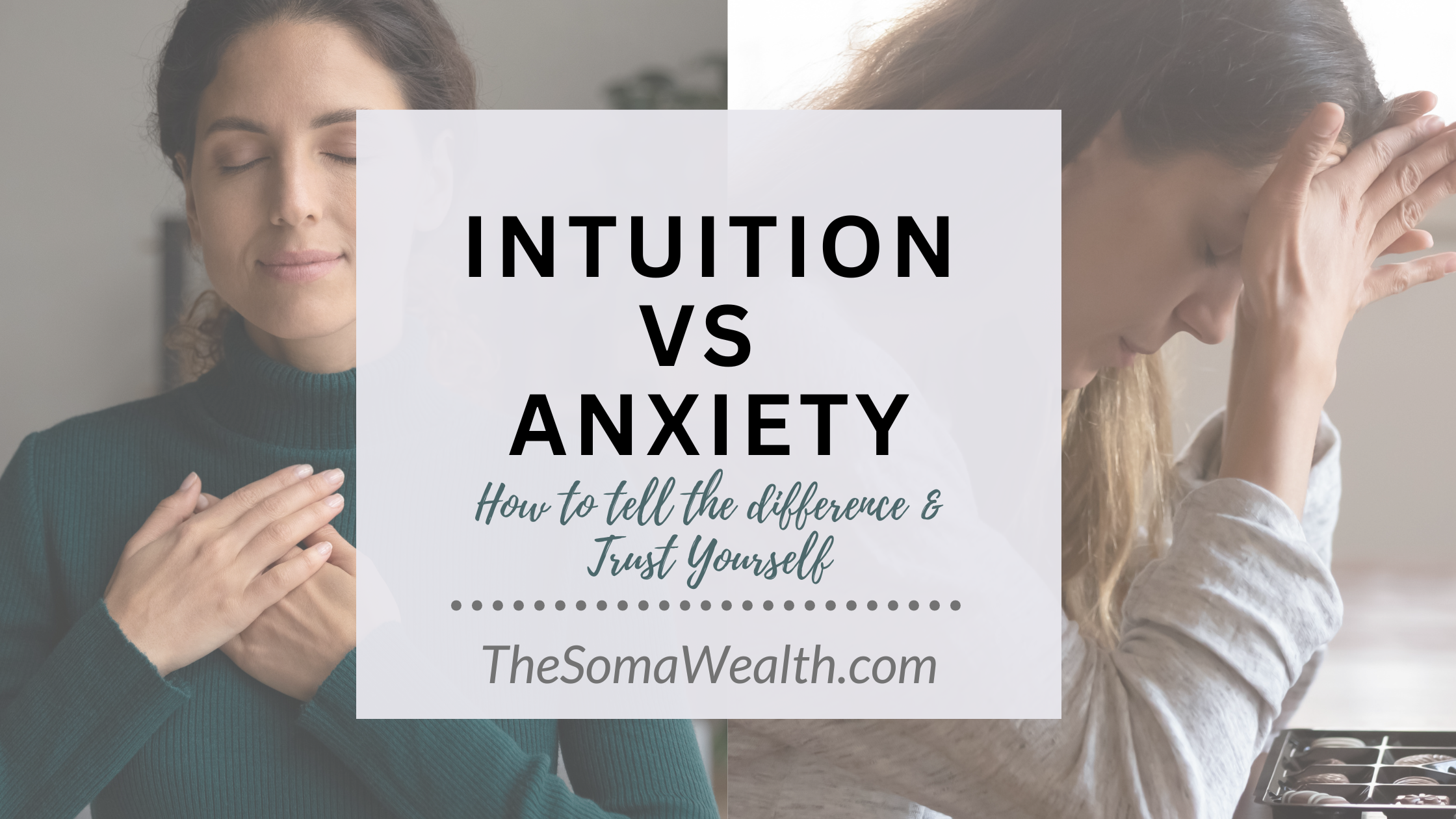
Have you ever been in a situation where you’ve got a feeling of worry or distress, and you couldn’t tell if it was your intuition signaling a real problem or just another bout of anxiety? Maybe it was about a relationship, a career move, or even money- like deciding whether to raise your prices, invest in yourself or say yes to a new opportunity. You may notice an uneasy feeling but can’t totally distinguish between the two because it’s not uncommon for you to have intuitive thoughts that have been accurate.
Key Differences Between Intuition vs Anxiety
Intuition is a powerful feeling that arises from within. It feels like an invitation of certainty without needing a reason. It doesn’t come with a story; instead, it’s more of a gentle nudge, a felt sense that often brings clarity and a sense of peace.
When our intuition speaks, it often presents valuable insights as a clear answer. Some may think of it as a sixth sense, inner wisdom, or a gut instinct that is not clouded by negative thoughts or worst-case scenarios. I find that true intuition is more matter-of-fact in both myself and the clients I work with. It tends to have a calm, confident feeling.
Anxiety, on the other hand, often comes with a story. With anxiety, we experience things such as a racing mind, self-doubt, shortness of breath, or other physical symptoms in the body. There’s more of a sense of fear, worry, and urgency. Our bodies feel activated, there’s more of a, I need to “do” something or what we would call a fight-or-flight response. In contrast, intuition feels more grounded.
If I had to sum it up in a few words: anxiety feels fear-based, while intuition feels like an invitation with a deep knowing attached.
What is Intuition?
The meaning of intuition is essentially to know something immediately or to have an instinctive feeling without conscious reasoning or effort. Let’s expand on this idea of intuition and look at examples of how intuition can appear in our lives.
Intuition tends to come to us suddenly, without warning, a soft and encouraging inner voice. It could present through a thought that comes out of nowhere. It could be an inner knowing that something is or isn’t going to work out. It could be a gut instinct about someone — that they have good intentions or deceitful intentions. Our intuition may also be an urge to leave a situation; we may feel that something isn’t right.
Intuition tends to be specific to a situation. For example, if you always attend a weekly exercise class in the morning, maybe there is one day something just doesn’t feel right about going at the time you usually go, and you feel you should go later in the day instead. It’s specific to one situation, not all workout classes in general.
Real-Life Examples of Intuition
- Everyday intuition: In a meditation class, I once had the intuitive thought to turn my phone back on, even though it was required to be off. It didn’t make sense, but I followed it. Within minutes, I received an important emergency call. The inner guidance was calm and clear, the urgency came after the fact as a response to the call.
- Big life moments: While helping a friend house-hunt, I walked into one home and immediately knew it was the one. It felt familiar, as if I had been in that space before. I stayed neutral so my friend could make the right choice for herself, but my inner wisdom was spot on.
- Money and career: In business, intuition may show up as knowing when to raise your prices, sensing when an investment is aligned, or feeling drawn to a new opportunity that expands your wealth. This is where intuitive abilities can support both personal growth and financial expansion.
These examples highlight how intuition often feels like clarity, grounded in the present moment, and carries a sense of peace — rather than panic or urgency.
What is Anxiety?
Anxiety is rooted in fear and doubt. It clouds decision-making with worry and overthinking. Instead of clarity, anxiety often feels muddy, filled with uncertainty and negative thoughts. Anxiety often develops from past experiences in which we felt unsafe in some way. When our threat detector senses some flavor of that experience, our anxiety alarm kicks on.
Some examples of how anxiety could show up:
- Feeling anxious about attending any workout class, not just a specific one.
- Ruminating over investing in yourself and leaning into how you know it won’t work- based on a story from your past.
- Needing to keep your phone on at all times to prevent a bad feeling of being unprepared.
Instead of supporting you, anxiety often becomes a block that holds you back from expansion.
While intuition helps you move forward with ease, anxiety keeps you stuck in loops of self-doubt, unease, and fear of making the wrong decision.
The Role of Your Nervous System
Our autonomic nervous system is shaped by past trauma, early experiences, and ongoing events throughout life. It determines much of how we respond to major decisions, intuitive insights, and stressful situations.
According to Polyvagal Theory, there are three main states:
- Ventral Vagal (safety & connection): In this state, you feel grounded, safe in the present moment, and able to connect with yourself and others. You’re most likely to experience clear intuitive thinking and true intuition here.
- Sympathetic (fight or flight): Your body prepares for danger with increased heart rate, tension, and urgency. This is the state most associated with anxiety and bodily sensations like tightness or shallow breath.
- Dorsal Vagal (shutdown): In this state, you may feel disconnected or numb. Anxiety can feel overwhelming here, and intuition is much harder to access.
While intuition can sometimes break through stress, the best way to hear it clearly is when your body feels safe and regulated. That’s why nervous system regulation is essential — not just for your emotional health, but also for making clear money and life decisions without being hijacked by fear.
You can learn more about your nervous system here.
Building Trust with Your Own Intuition
Learning to distinguish between your gut reactions and the swirl of anxious thoughts becomes easier with practice.
The more we engage with and use our intuition, the more we begin to trust it — and the easier it becomes to follow. Like a muscle, it strengthens with use.
Ways to practice building intuition:
- Start with small, low-stakes decisions (what to eat, which route to take, who to call).
- Journal your intuitive hits and the outcomes. Note what you felt in your body — the bodily sensations, the gentle nudge, the calm clarity.
- Pay attention to how intuition feels compared to anxiety: intuition often comes as a sense of peace, while anxiety brings an uneasy feeling and physical symptoms of stress.
As you strengthen your self-trust, it ripples into bigger areas — including financial choices. You’ll begin to sense the right choice around clients, investments, or opportunities without spiraling into doubt.
Decreasing Anxiety
The first step to decreasing anxiety is to recognize and accept it without judgment. Anxiety affects many of us, and it does not define who you are.
Steps to ease anxiety:
- Awareness: Notice physical symptoms like racing heart or tense muscles.
- Acceptance: Fighting anxiety makes it stronger; acceptance softens it.
- Tools: Breathwork, mindfulness, EFT tapping, or movement can calm your nervous system.
- Lifestyle: Sleep, nutrition, and reducing stimulants support balance.
- Support: Talking with a trusted friend, coach, or therapist helps release self-doubt and negative thoughts.
When your nervous system feels supported, anxiety quiets — and intuition becomes clearer. That clarity is the foundation for confident decision-making, whether in daily life or major money choices.
Key Takeaways
- Intuition is calm, specific, and supportive, a deep knowing that brings clarity.
- Anxiety is broad, urgent, and fear-driven, often rooted in past trauma and negative thoughts.
- Your nervous system state strongly influences whether you access intuition or anxiety.
- Building intuitive abilities through practice leads to personal growth, self-trust, and better decisions.
When you learn to tell the difference between intuition and anxiety, you open the door to deeper trust in yourself. That trust impacts not only your relationships and daily life, but also your money and wealth. Because when your nervous system feels safe and regulated, you can hear your true intuition clearly, make the right choices with ease, and expand your capacity to receive abundance.
Karla is a certified somatic practitioner who helps women heal their nervous system and transform their relationship with money and wealth.
